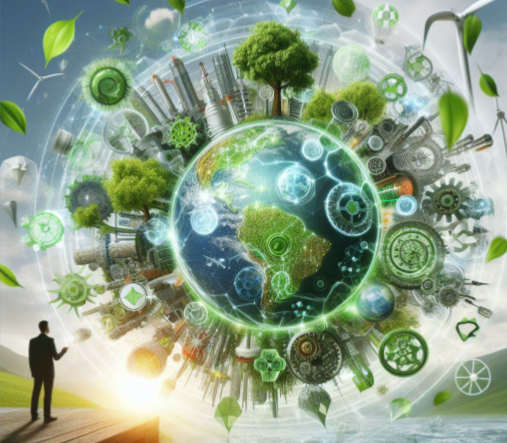Environmental technology, also known as green tech or clean tech, plays a crucial role in addressing global environmental challenges such as climate change, pollution, and resource depletion. From renewable energy solutions to waste management technologies, innovative environmental technologies are paving the way for a more sustainable and resilient future. In this article, we’ll explore the latest advancements in environmental technology and their potential impact on environmental conservation and sustainability.

The Urgency of Environmental Conservation
Addressing Climate Change
Climate change poses an existential threat to the planet, with rising temperatures, extreme weather events, and melting ice caps threatening ecosystems, biodiversity, and human well-being. Mitigating climate change requires urgent action to reduce greenhouse gas emissions, transition to renewable energy sources, and adopt sustainable land use practices.
Protecting Natural Resources
The conservation of natural resources, including clean air, water, and soil, is essential for maintaining ecological balance and supporting human health and livelihoods. Sustainable resource management practices, such as water conservation, forest protection, and soil restoration, are critical for preserving ecosystems and biodiversity.
Recent Innovations in Environmental Technology
Renewable Energy Solutions
Advancements in renewable energy technologies, such as solar, wind, and hydroelectric power, are driving the transition to a low-carbon energy future. Solar photovoltaic (PV) panels, wind turbines, and hydroelectric dams generate clean and renewable energy without emitting greenhouse gases, reducing reliance on fossil fuels and mitigating climate change.
Waste Management and Recycling
Innovative waste management technologies, including waste-to-energy systems, recycling processes, and composting facilities, are transforming the way we manage and dispose of waste. These technologies reduce landfill emissions, recover valuable resources from waste streams, and promote circular economy principles by minimizing waste generation and maximizing resource efficiency.
Applications Across Industries
Clean Transportation
The transportation sector is a major contributor to air pollution and greenhouse gas emissions, accounting for a significant portion of global carbon emissions. Environmental technologies such as electric vehicles (EVs), hydrogen fuel cells, and sustainable aviation fuels offer cleaner and more sustainable alternatives to traditional fossil fuel-powered vehicles, reducing emissions and improving air quality.
Smart Agriculture
Environmental technology is revolutionizing agriculture practices, enabling farmers to optimize resource use, minimize environmental impact, and increase productivity. Precision agriculture technologies, such as IoT sensors, drones, and data analytics, provide real-time insights into soil health, crop performance, and water usage, allowing farmers to make data-driven decisions and improve sustainability.
Challenges and Opportunities
Scaling Up Adoption
One of the key challenges facing environmental technology is scaling up adoption and deployment to achieve meaningful impact at a global scale. This requires overcoming barriers such as high upfront costs, regulatory hurdles, and market barriers, while incentivizing investment and innovation in green technologies.
Addressing Technological Limitations
While environmental technologies hold great promise for addressing environmental challenges, they also face technological limitations and trade-offs. For example, renewable energy sources such as solar and wind power are intermittent and require energy storage solutions to ensure reliability and grid stability.
Conclusion
Environmental technology holds the key to building a more sustainable and resilient future for generations to come. By harnessing the power of innovation, collaboration, and investment, we can develop and deploy innovative solutions to address pressing environmental challenges and create a world where humans and nature can thrive together in harmony.